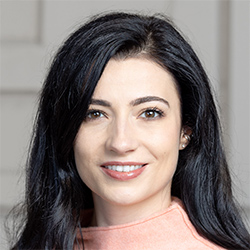Northwestern Materials Science Welcomes Jennifer Fowlie
Fowlie will officially come aboard September 2024 as an assistant professor
Jennifer Fowlie has mostly worked in physics departments. She earned her PhD in physics at the University of Geneva, and currently works at the SLAC National Accelerator Laboratory and Stanford University.
Why, then, will Fowlie join Northwestern Engineering’s Department of Materials Science and Engineering (MSE) as an assistant professor in the fall of 2024?

“One of the things that I really like about most materials science and engineering departments is their interdisciplinary nature, and specifically Northwestern's MSE department,” Fowlie said. “Northwestern MSE is world-leading by basically any metric you can come up with, and I was really impressed with how interdisciplinary it is, and also how much people actually work with each other. There's a lot of collaboration within the department, and they also have quite a strong vision for what they want to be in the future.
“I saw this talking to various people, and my feeling overall is that materials science and engineering is one of these fields where a department really benefits from being very flexible and able to adapt quickly. I think Northwestern has always been at the forefront of innovation in materials science and engineering. They're very well-placed to continue like that in the future.”
That mindset, Fowlie said, will help her research in quantum materials.
“There's this huge worldwide push to develop quantum technologies, and one of the things that really limits people is the materials. It’s really shocking how far some physicists get before realizing that is an issue,” Fowlie said. “If we're really going to be serious about the quantum future, then we need to actually harness the best quantum materials scientists, quantum physicists, quantum chemists, and all of their experiences together to actually do something.
“For my particular research, it's important that it’s in a really interdisciplinary place. Otherwise, you are on your small island and you perhaps don't realize the problem that you're working on is something that someone else has already done because the language is slightly different. It's just much, much better to have people right next door to you to go and get a coffee with. And you realize very quickly that you have the same kind of challenges, and probably the same kind of solutions.”
During her career, Fowlie has learned to speak different research languages, and function in different research cultures. Before her PhD in Switzerland, Fowlie grew up on a farm in the north of Scotland and earned her master of physics at the University of St. Andrews.
That experience, Fowlie said, made her more comfortable communicating with people from different cultures.
“You see how they're reacting to the way that you're expressing yourself, and you adjust accordingly,” Fowlie said. “That's something that you only get through practice, and that's been very valuable.”
